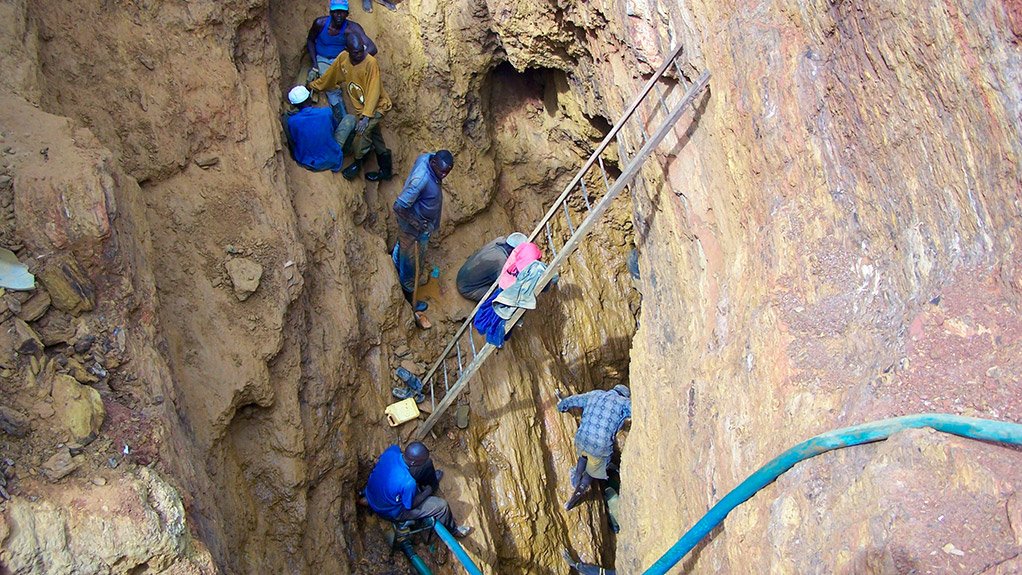Artisanal gold mining has economic value, call to legalise



ALAN MARTIN Owing to a lack of government support, artisanal and small-scale miners often trade gold on the black market, depriving countries of revenue
EMPLOYING MILLIONS The illicit ASM mining sector collectively employs about three-million mineworkers in Mali, Burkina Faso and Côte d’Ivoire
Natural resources governance- focused nongovernment organisation Partnership Africa Canada (PAC) is advising the governments of Mali, Burkina Faso and Côte d’Ivoire to decriminalise artisanal and small-scale mining (ASM) in the gold sector to allow for structure and policy coherence that will enable these countries to track and secure its economic benefits.
Canada-based PAC director of research Alan Martin tells Mining Weekly that these governments regard ASM as an activity to criminalise, rather than formalise and legalise.
“If you were to bring [artisanal miners] into the legal system, you would be able to better organise how they mine and where they mine. You will be able to collect taxes and you will be able to better regulate or try to mitigate predatory networks.”
In a report, titled ‘The West African El Dorado: Mapping the illicit trade of gold in Côte d’Ivoire, Mali and Burkina Faso’, coauthored by Martin for PAC, he states that the low presence of government involvement in the ASM sector has avoidable consequences.
The illicit ASM sector collectively employs about three-million mineworkers in Mali, Burkina Faso and Côte d’Ivoire.
The extent of the mineworkers’ gold production is largely unknown because it cannot be regulated at this point and, therefore, the sector’s economic contribution to these countries cannot be calculated.
Governments mostly prioritise industrial mining over ASM, causing the ASM sector to become “chaotic”, Martin explains, adding that, owing to a lack of government support, ASM often trades gold on the black market, depriving countries of revenue.
This revenue completely bypasses the formal sector and government channels, and Martin says Mali’s ASM gold sector production is on the same level as its industrial gold sector when considering conflicting export-import data between Mali and the United Arab Emirates (UAE).
Fighting for Exports
ASM gold from West Africa is smuggled through various channels, pre-established by traders, with shipments either smuggled directly or laundered into legal exports to refineries in Dubai.
Mali, Burkina Faso, Côte d’Ivoire, Sierra Leone and Guinea all levy a 3% export tax on gold, but there is a loophole in Mali’s tax regime. Mali levies a tax of 3% only for the first 50 kg of a gold shipment.
For example, if an exporter has a gold shipment of 200 kg, the remaining 150 kg can be exported tax-free.
Subsequently, Guinea lowered its export tax to 0% in February 2016 because it was concerned about gold lost to Mali because of cheaper exports.
This caused a chain reaction, as Sierra Leone did not take kindly to this, as it is expected that large amounts of gold were already passing through Guinea to Mali, states Martin.
“People are always going to seek the lowest tax jurisdiction,” he says, pointing out that governments, particularly in West Africa, must have a discussion to try to create a regional and harmonised tax policy on gold, so that there is no incentive for illicit dealers or smugglers to “shop around” for the most affordable point of export.
There will be no need, therefore, to smuggle gold from one country to another, as export tax will be consistent.
Better Due Diligence Needed
Martin explains that most major mining companies have numerous mines in Mali, Burkina Faso and Côte d’Ivoire.
These companies tend to focus exports on refineries in South Africa and Switzerland, which are accounted for, but trade statistics show that ASM gold is being exported to Dubai.
Statistics paint a worrying trend of the UAE’s role in the illicit trade of gold through Mali, for instance, he says.
Martin further emphasises that, according to the United States Geological Survey, Mali produced 35.7 t of gold in 2011, 40.1 t in 2012, 40 t in 2013 and 45.8 t in 2014, but these figures seem inaccurate after the United Nation’s database, Comtrade, reported data provided by the UAE, revealing that, during the same years, the region imported 9.6 t of Malian gold in 2011, 29.1 t in 2012, 49.6 t in 2013 and 59.9 t in 2014.
Although compliance with the London Bullion Market Association’s Responsible Gold Guidance standard and gold industry market development organisation the World Gold Council’s conflict-free gold standard is voluntary, Martin states that it is possible to hold refineries accountable.
He explains that gold, tin, tungsten and tantalum used to fund conflict in, for example, the Democratic Republic of Congo, has resulted in global industry leaders practising better due diligence when sourcing precious minerals.
In the gold sector, it is easy to identify flawed points in the supply chain, Martin says, noting that, for example, jewellery companies that subscribe to Organisation for Economic Cooperation and Development due diligence standards can place pressure on refineries to declare their sources and provide concrete assurance that their gold supply is not trafficked or illicit.
Refiners, he says, have a responsibility to ask their West African suppliers from which operations their gold is sourced.
Article Enquiry
Email Article
Save Article
Feedback
To advertise email advertising@creamermedia.co.za or click here
Press Office
Announcements
What's On
Subscribe to improve your user experience...
Option 1 (equivalent of R125 a month):
Receive a weekly copy of Creamer Media's Engineering News & Mining Weekly magazine
(print copy for those in South Africa and e-magazine for those outside of South Africa)
Receive daily email newsletters
Access to full search results
Access archive of magazine back copies
Access to Projects in Progress
Access to ONE Research Report of your choice in PDF format
Option 2 (equivalent of R375 a month):
All benefits from Option 1
PLUS
Access to Creamer Media's Research Channel Africa for ALL Research Reports, in PDF format, on various industrial and mining sectors
including Electricity; Water; Energy Transition; Hydrogen; Roads, Rail and Ports; Coal; Gold; Platinum; Battery Metals; etc.
Already a subscriber?
Forgotten your password?
Receive weekly copy of Creamer Media's Engineering News & Mining Weekly magazine (print copy for those in South Africa and e-magazine for those outside of South Africa)
➕
Recieve daily email newsletters
➕
Access to full search results
➕
Access archive of magazine back copies
➕
Access to Projects in Progress
➕
Access to ONE Research Report of your choice in PDF format
RESEARCH CHANNEL AFRICA
R4500 (equivalent of R375 a month)
SUBSCRIBEAll benefits from Option 1
➕
Access to Creamer Media's Research Channel Africa for ALL Research Reports on various industrial and mining sectors, in PDF format, including on:
Electricity
➕
Water
➕
Energy Transition
➕
Hydrogen
➕
Roads, Rail and Ports
➕
Coal
➕
Gold
➕
Platinum
➕
Battery Metals
➕
etc.
Receive all benefits from Option 1 or Option 2 delivered to numerous people at your company
➕
Multiple User names and Passwords for simultaneous log-ins
➕
Intranet integration access to all in your organisation



















